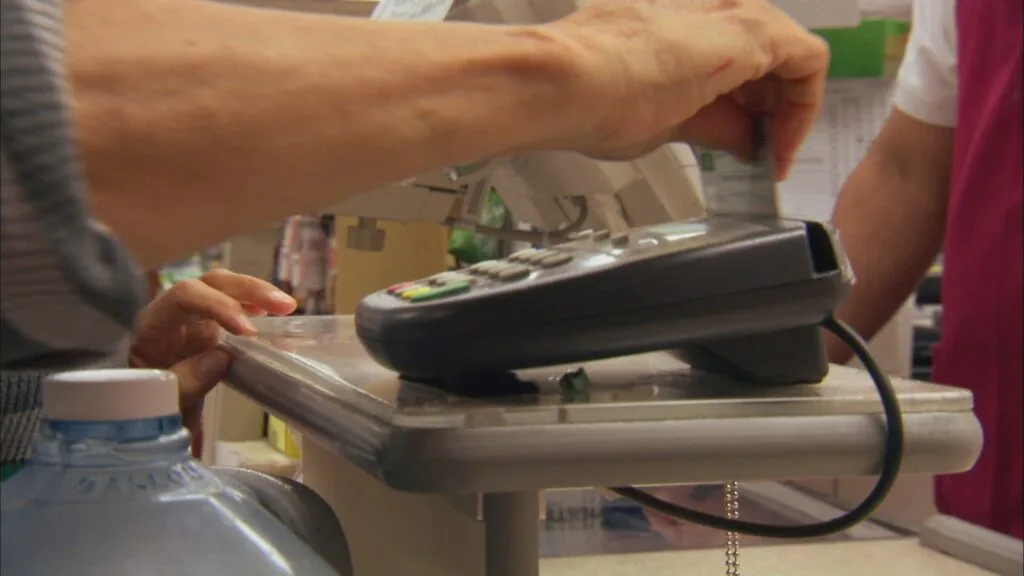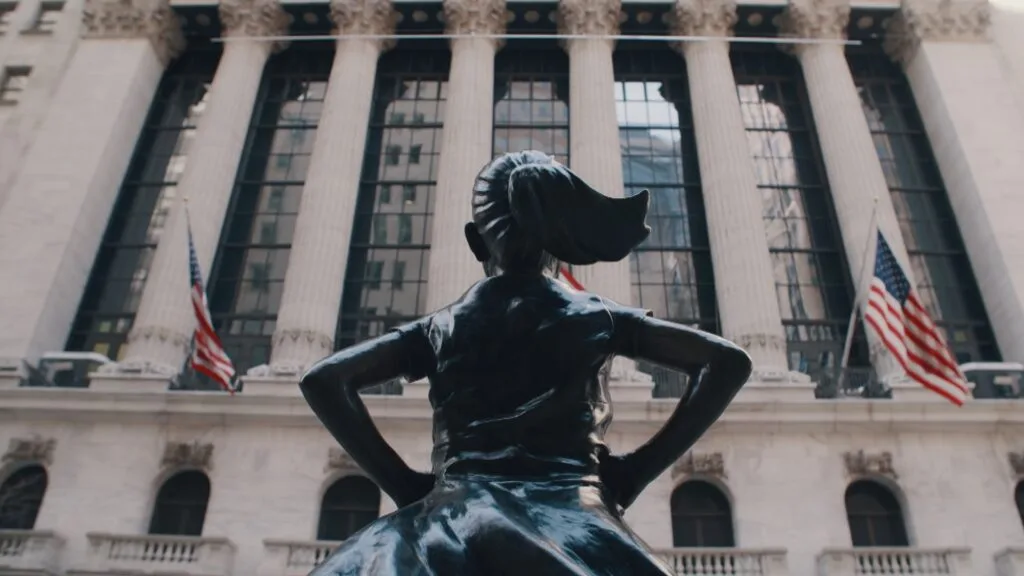As Credit Card Debt Hits an All-time High for Americans, Regulators Again Take Aim at ‘Excessive’ Fees

August 16, 2023
Share
When Elizabeth Blascruz was late on a payment for the $480 balance on her credit card, it triggered a chain reaction.
There was a fee for her late payment and an increase in her interest rate, which then put her balance over the card’s credit limit, resulting in another fee. This process compounded for months as she struggled to pay the card down. Ultimately, Blascruz said she paid more than $3,000 — five times the original $480 bill.
Blascruz shared her story for the 2009 documentary The Card Game, which is newly available to watch on FRONTLINE’s YouTube channel. The documentary examined key efforts by lawmakers to rein in certain fees on credit cards and overdraft fees on debit cards that many consumer advocates say exploit low-income borrowers. As the documentary showed, Congress took aim at the types of fees Blascruz faced by passing the most significant piece of credit card legislation in decades. Called the CARD Act, it radically altered how much banks could penalize consumers for not paying on time and sharply limited over-the-limit fees, among other reforms.
Fourteen years later, as American consumers’ credit card debt has ballooned to record levels, advocates say banks have found ways around the CARD Act’s regulations. Now, regulators and lawmakers are renewing their focus on how to regulate late fees, though other efforts, like limiting overdraft fees, have stalled.
Impact of the CARD Act
Banking industry groups have contended that the CARD Act ultimately harms consumers. Since banks are losing out on revenue streams from late fees, they say credit card issuers make up for it in other ways, like increasing interest rates or being more selective about granting cards to risky borrowers. In 2015, the American Bankers Association said that the legislation resulted in higher interest rates, higher annual fees for cards and less available credit for consumers, particularly those with low incomes.
But some academic research suggests the opposite. Neale Mahoney, a professor of economics at Stanford University, was co-author of a leading 2015 study that analyzed how 160 million credit card accounts were affected by the legislation and found the CARD Act’s reforms saved consumers something to the tune of $11.9 billion per year. While some critics of the CARD Act predicted consumers would make more late payments if they faced a smaller late fee, Mahoney’s study found that wasn’t the case.
“When people don’t pay their credit cards on time, it’s either because they forget or because they don’t have the cash on hand,” Mahoney said. “It’s not because they’re making a sort of strategic benefit-cost analysis based upon the dollar amount of the late fee.”
The researchers concluded that even consumers with low credit scores had similar access to credit after the legislation passed. They also found that banks did not raise interest rates on credit cards enough to counteract the savings brought to consumers through lower fees.
A New Proposed Rule for Credit Cards
In the decade following the CARD Act, credit card debt for Americans ballooned. There was a brief reprieve early in the pandemic as many used extra savings cushioned by stimulus payments to pay down cards, but now, that period of declining balances is over. Jill Gonzalez, an analyst at consumer finance and credit research site WalletHub, said credit card debt has reached an all-time high of $1 trillion.
“The constant Fed rate hikes and the record-high inflation had a major impact on the average cardholder’s budget, making it difficult to afford monthly expenses and debt repayment,” she said, leading to the significant growth in debt.
As prices for everything from groceries to cars have gone up, Gonzalez said that late fees have been rising too. That’s because provisions in the CARD Act allow banks to adjust their late fees as inflation rises. Late fees have now reached highs of $30 for the first month of late payment and $41 per month for a repeat violation, she said, up from $25 and $35 when the CARD Act passed.
But the increase in fees has drawn the attention of regulators. In February, the Consumer Financial Protection Bureau — a federal agency established following the 2008 financial crisis to ensure fair financial treatment for consumers — proposed a new rule for what it described as “excessive” late fees on credit cards. It would limit late fees to $8 for the first month that a cardholder is late, stop the increase of late fees with inflation and cap late fees at 25% of the required payment.
During its public comment period, which ended in May, the CFPB received 57,000 comments on the proposed legislation but has not yet released an update on the rule. Many industry groups, like the American Bankers Association and the Consumer Bankers Association, have expressed opposition to the proposal, saying that it will have negative consequences for consumers and their access to credit. Neale Mahoney of Stanford, who said the rule would mark the most significant updates to credit card legislation since the CARD Act, isn’t surprised by the reaction from the industry.
“The industry response is basically the same set of talking points that we encountered in the run-up to the CARD Act,” Mahoney said.
The Fight Against Overdraft Charges
As explored in The Card Game, the CARD Act left out a significant reform sought after by consumer advocates: limiting overdraft fees linked to debit cards. Fourteen years later, that reform has still not passed. Banks charge these fees, often around $35 per transaction, to safeguard themselves from risks that arise when a customer doesn’t have enough in their checking account to cover a purchase. A spokesperson from the American Bankers Association, which has defended the fees, emphasized that users can opt-out and instead have the transactions declined.
But some lawmakers have said for years that such fees, sometimes charged multiple times per day if a checking account is negative, mean high revenues for banks at the cost of marginalized and low-income Americans. One of those lawmakers is Sen. Elizabeth Warren, who raised the issue again in 2022 when she supported the Stop Overdraft Profiteering Act. The bill failed to make it out of the Committee on Banking, Housing, and Urban Affairs.
In a statement, Warren told FRONTLINE that the use of overdraft fees remains “relentless” by banks, but praised the Consumer Financial Protection Bureau’s efforts to curb them. The CFPB has called overdraft fees “exploitative,” and a spokesperson for the agency said it is currently considering rules to limit the ways banks can charge them.
The Card Game is the latest documentary from FRONTLINE’s extensive archives to be released on the series’ YouTube channel:

Former Tow Journalism Fellow, FRONTLINE/Newmark Journalism School Fellowships, FRONTLINE
Email:
james_odonnell@wgbh.orgRelated Documentaries
Latest Documentaries
Related Stories
Related Stories
Explore
Policies
Teacher Center
Funding for FRONTLINE is provided through the support of PBS viewers and by the Corporation for Public Broadcasting, with major support from Ford Foundation. Additional funding is provided the Abrams Foundation, Park Foundation, John D. and Catherine T. MacArthur Foundation, Heising-Simons Foundation, and the FRONTLINE Trust, with major support from Jon and Jo Ann Hagler on behalf of the Jon L. Hagler Foundation, and additional support from Koo and Patricia Yuen. FRONTLINE is a registered trademark of WGBH Educational Foundation. Web Site Copyright ©1995-2025 WGBH Educational Foundation. PBS is a 501(c)(3) not-for-profit organization.




























